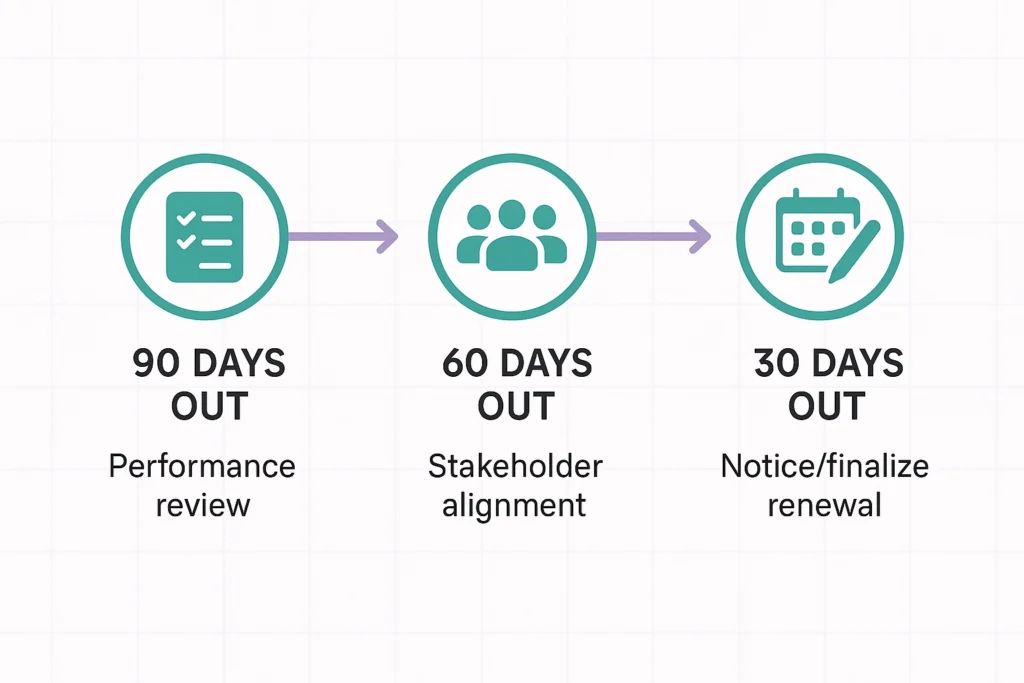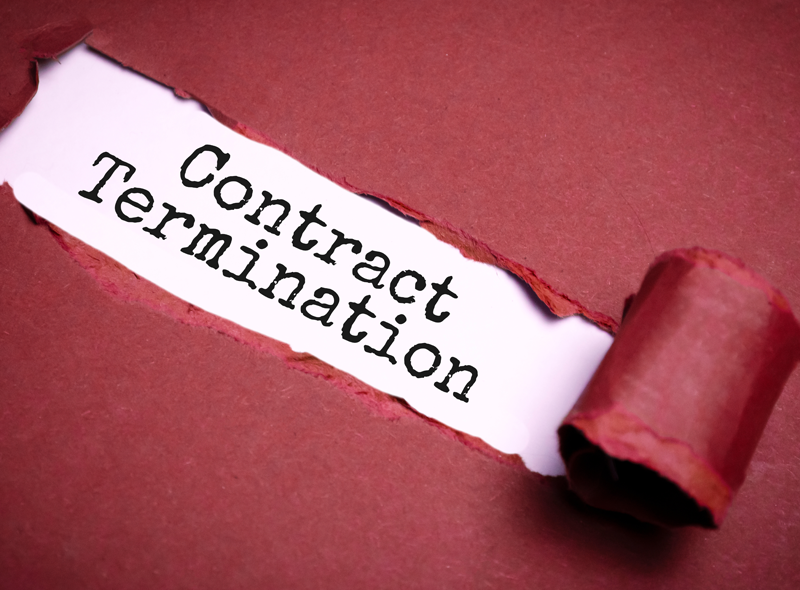Contract Expiration Explained: Risks, Mistakes, and How to Stay Ahead

- Last Updated: Dec 30, 2025
- 15 min read
- Sirion
Imagine this: your company relies on a critical piece of software. The subscription has been running smoothly for years, a line item in the budget you barely think about. Then, one Tuesday morning, everything grinds to a halt. The software is offline. After a frantic call, you discover the problem: the contract expired last week. No one noticed. Now you’re facing operational chaos and scrambling to renegotiate, likely from a much weaker position.
This isn’t a rare horror story; it’s a common consequence of treating contract expiry as a simple date on a calendar. In reality, an expiration date isn’t just an endpoint—it’s a critical decision point that, if ignored, can lead to costly disruptions, missed opportunities, and significant legal risk.
Understanding what contract expiry truly means and how to manage it proactively is one of the foundational skills of effective business management.
So, What Exactly Is a Contract Expiration?
At its simplest, a contract expiry date is the pre-agreed moment when a contract’s terms and conditions naturally come to an end. Think of it like the end of a lease on an apartment; both parties knew the end date from the very beginning. It’s a planned conclusion to the agreement.
But here’s where a lot of confusion begins. People often use the terms “expiry” and “termination” interchangeably, but they are fundamentally different. Getting this distinction right is crucial.
So, what’s the difference? An expiration is the natural, scheduled end of the contract’s life. A termination of a contract, on the other hand, is an early end triggered by a specific event, like one party failing to meet its obligations (a breach) or one party giving a required notice.
Learn how a Breach of Contract disrupts agreements when one party fails to deliver on its promises.
Different Forms of Contract Expiration
Not all expirations look the same—how a contract concludes often depends on how it was structured at the outset. The most common forms include:
- Fixed-Term Expiration – The contract ends on a specific date agreed in advance, with no continuation unless parties actively negotiate a new agreement.
- Evergreen Expiration – These contracts automatically renew after each term unless one party provides notice to terminate. Without careful monitoring, evergreen contracts can quietly extend obligations for years.
- Conditional Expiration – The contract concludes when a particular event occurs (e.g., completion of a project, delivery of a milestone), rather than on a date.
- Renewal-Based Expiration – Some contracts expire but contain built-in renewal options, requiring formal action by both parties to extend or renegotiate.
Understanding these forms helps organizations prepare for what happens next—whether that’s a smooth closeout, a proactive renewal, or a renegotiation of terms.
Contract Expiration vs. Renewal—Why It Matters
- Expiry – The natural conclusion of an agreement, with both parties parting ways unless new terms are established.
- Renewal – A conscious choice to extend, renegotiate, or evolve the relationship.
Many organizations blur this line, leading to missed opportunities. Expiry without planning creates disruption, while renewal without review locks in outdated obligations. A clear distinction helps teams approach each with intent.

Now that we’ve clarified expiry vs. termination, the next question is: what’s at stake if expiry is ignored?
The Risks of Ignoring Contract Expiration
Contract expiry isn’t just about dates slipping off a calendar—it comes with tangible risks that can ripple across the organization:
- Operational disruption – As seen in our opening scenario, missing an expiry can halt critical services overnight.
- Financial impact – Unmonitored auto-renewals lock you into unfavorable terms or higher costs.
- Compliance breaches – In regulated industries, expired contracts can lead to audit failures or fines.
- Relationship strain – Allowing a contract to lapse without review erodes vendor trust and weakens your negotiating position.
By recognizing these risks early, businesses can treat expiry management as a core governance function, not an afterthought.
Explore how strong Contract Governance ensures expirations and renewals are managed with foresight, not left to chance.
What Happens When the Clock Runs Out?
When a contract reaches its expiration date, it doesn’t just vanish into thin air. One of several things will happen, and being prepared for each scenario is key to avoiding trouble. This is where a proactive approach to contract management really pays off.
The outcomes of an expired contract usually fall into a few key categories, often dictated by the renewal clauses within the agreement itself.
It’s important to understand the possibilities before the deadline is upon you. Generally, you’ll face one of these situations:
- Planned Conclusion: The contract ends, and both parties go their separate ways. All obligations are fulfilled, and the business relationship concludes as planned. This is the simplest and cleanest outcome.
- Manual Renewal: The contract is set to expire, but both parties decide to actively negotiate and sign a new agreement. This is an opportunity to revisit terms, adjust pricing, and ensure the contract still aligns with your business goals.
- Automatic Renewal: Many contracts, especially for subscriptions and services, contain an automatic renewal clause. If you don’t provide notice of termination by a specific date, the contract automatically renews for another term. This is convenient but can be a costly trap if you’re not tracking it.
- The “Zombie” Contract: This is the riskiest scenario. The contract expires, but both parties continue to act as if it’s still in effect—payments are made, services are rendered. This creates an “implied contract” whose terms can be vague and difficult to enforce, exposing your business to significant contract management risks.
While expiry marks the end of a contract’s lifecycle, renewal opens a new one—and the difference is critical.
Future-Proof Your Contracts with GenAI
Discover how pairing GenAI with CLM unlocks new efficiencies and risk insights in How to Build a Generative AI Contracting Strategy.

Common Mistakes in Managing Contract Expiry
Many of the horror stories around expiry come down to avoidable mistakes.
Some of the most common include:
- Relying on spreadsheets – workable for a handful of contracts, but unscalable as portfolios grow.
- Missing notice periods – overlooking a 30- or 60-day notice window that leads to unwanted auto-renewals.
- Fragmented ownership – no single accountable stakeholder, leaving expiry management scattered across teams.
- Failure to align stakeholders – neglecting to loop in finance, procurement, or business owners before renewal discussions.
Addressing these missteps early saves time, money, and reputational damage.
How Can You Get Ahead of Expiry Dates?
The secret to managing contract expiry isn’t complex; it’s about being proactive instead of reactive. Instead of scrambling when you get a renewal notice, you can implement a simple “countdown” system to stay in control. A structured contract review process is your best defense against last-minute surprises.
By creating a playbook for the 90 days leading up to an expiration date, you give yourself ample time to evaluate performance, align with stakeholders, and make a strategic decision.

The 90-Day Pre-Expiry Lifecycle flowchart guides users through essential contract review and decision tasks to prevent unintended expiries or auto-renewals. This clear process builds proactive contract management habits.
This structured approach transforms the entire contract lifecycle management process from a frantic rush into a calm, strategic exercise. It ensures you have the data and the time you need to make the best possible decision for your business.
Beyond operational efficiency, contract expiry is a compliance issue—and regulators are paying attention.
Learn how a Contract Compliance Audit helps uncover hidden risks, ensure obligations are met, and keep your business audit-ready.
Contract Expiry and Compliance Obligations
- Data privacy laws (e.g., GDPR, HIPAA) require proof of valid agreements for vendors handling sensitive information.
- Financial regulations (e.g., SOX) demand accurate recordkeeping, including contract end dates and renewal terms.
- Audit readiness – expired agreements without formal closure create “loose ends” that auditors flag.
In industries where compliance is non-negotiable, expiry management isn’t just governance—it’s risk mitigation.
Part of staying ahead is knowing what the contract itself says about expiry. Several clauses deserve extra attention.
Contract Expiration Clauses That Can Trip You Up
- Evergreen clauses – auto-renewals that roll over unless explicitly terminated.
- Termination notice requirements – strict deadlines for providing written notice, often buried deep in the fine print.
- Escalation clauses – pricing that automatically increases upon renewal if not renegotiated.
- Exit provisions – details on handover, transition, or asset return at expiry.
Tracking these clauses systematically ensures expiry doesn’t sneak up on you in unexpected ways.
How Do You Decide and Keep Everything Organized?
With a 90-day heads-up, the final question becomes: should you renew, renegotiate, or walk away? The answer lies in the data you’ve gathered. A thoughtful approach to contract renewal involves asking a few key questions:
- Performance: Did the vendor or partner meet their obligations and SLAs?
- Value: Is the price still fair for the value being delivered?
- Need: Does our business still need this product or service?
- Alternatives: Are there better or more cost-effective options on the market?
Once you’ve made a decision, the final piece of the puzzle is organization. For businesses with just a handful of contracts, a simple spreadsheet can be a lifesaver. Effective contract monitoring starts with tracking the basics: the counterparty, the expiration date, the notice period, and the owner. Even a basic contract template for tracking can prevent catastrophic oversights.
![]()
A contract tracking spreadsheet acts as a memory anchor, making it easier to visualize and remember the key elements needed to keep contracts organized and avoid costly oversights.
As your business grows, however, the number and complexity of your contracts will quickly outpace a manual system. This is the point where organizations turn to dedicated CLM platforms to automate tracking, alerts, and performance analysis, turning contract data into a strategic asset.
This is where modern CLM platforms powered by AI take expiry management to the next level.
Experience AI-Native CLM in Action
See how Sirion transforms contracting with automation, compliance, and faster time-to-contract.

Technology and AI in Contract Expiry Management
- Automated alerts – notifications for upcoming expiries and notice periods.
- Contract analytics – AI insights to evaluate vendor performance before renewal.
- Playbooks and workflows – structured processes for renewals, renegotiations, or exits.
- Integration – syncing expiry data across ERP, CRM, and procurement systems for enterprise-wide visibility.
Instead of expiry being a reactive fire drill, AI-driven CLM makes it a strategic decision point.
Beyond the Date
Contract expiry is more than a date—it’s an opportunity. It’s a chance to reassess relationships, optimize spending, and mitigate risk. By shifting from a reactive to a proactive mindset, you can transform these deadlines from potential threats into moments of strategic advantage, ensuring your business is always on solid ground.

Sirion is the world’s leading AI-native CLM platform, pioneering the application of Agentic AI to help enterprises transform the way they store, create, and manage contracts. The platform’s extraction, conversational search, and AI-enhanced negotiation capabilities have revolutionized contracting across enterprise teams – from legal and procurement to sales and finance.
Frequently Asked Questions (FAQs)
What if a contract doesn't have an expiry date?
A contract without an expiry date is often called a “perpetual” or “evergreen” contract. These agreements typically remain in effect until one of the parties decides to terminate it according to the conditions laid out in the termination clause, which usually involves providing a specific amount of notice.
Can a contract be renewed with just a verbal agreement?
While some simple contracts can be verbally renewed in certain jurisdictions, it is extremely risky and not recommended. A verbal agreement lacks a clear record, making it difficult to prove the new terms, duration, and conditions if a dispute arises. Always get renewals in writing.
What is the difference between a contract extension and a renewal?
An extension typically lengthens the term of the existing contract, keeping all other terms and conditions the same. A renewal, on the other hand, involves creating a new contract that replaces the old one. A renewal is an opportunity to renegotiate terms, pricing, and scope, whereas an extension is usually just a simple continuation.
What happens to confidential information after a contract expires?
Most well-drafted contracts include a confidentiality clause that specifies how confidential information must be handled after the agreement ends. This clause often states that the obligations of confidentiality “survive” the expiration of the contract, meaning both parties are still legally bound to protect that information for a specified period or indefinitely.
How does contract expiry work for freelance or employment agreements?
For fixed-term employment or freelance contracts, the expiration date marks the end of the engagement. It’s crucial for both parties to discuss renewal or a new contract well before this date to avoid an abrupt end to the working relationship. If work continues without a new agreement, it can create a legally ambiguous situation regarding employment status and obligations.
Can you backdate a contract renewal after expiry?
Technically, some businesses try to backdate a renewal to cover the gap between expiry and the new agreement. However, this practice is risky. Backdating can create legal ambiguities, especially if disputes or compliance checks arise. The safer approach is to negotiate and execute a new contract promptly, ensuring continuity without retroactive fixes.
What are the risks of auto-renewal clauses in contracts?
Auto-renewals seem convenient, but they can lock organizations into outdated pricing, unfavorable terms, or vendor relationships that no longer serve business needs. Without tracking notice periods, you may lose the leverage to renegotiate. Proactive monitoring of auto-renewals ensures you remain in control of spend and terms.
How long should contract records be retained after expiry?
Retention periods depend on industry regulations and company policy. For example, financial services may require keeping expired contracts for seven years, while healthcare or government contracts may mandate longer retention. Keeping a centralized repository with clear retention policies ensures compliance and easy access for audits.
Additional Resources

What is Termination of Contract? Examples and Reasons
 8 min read
8 min read
